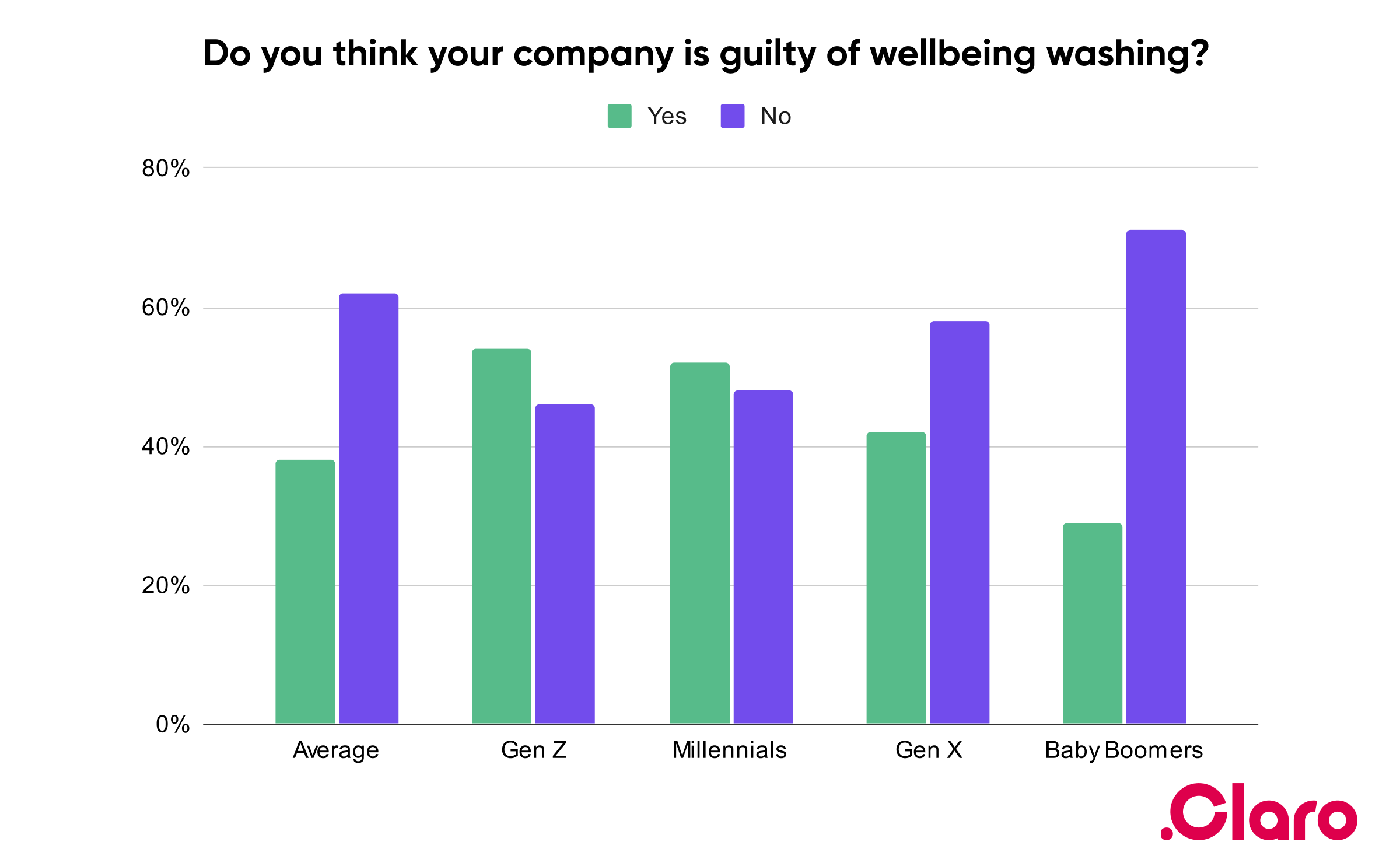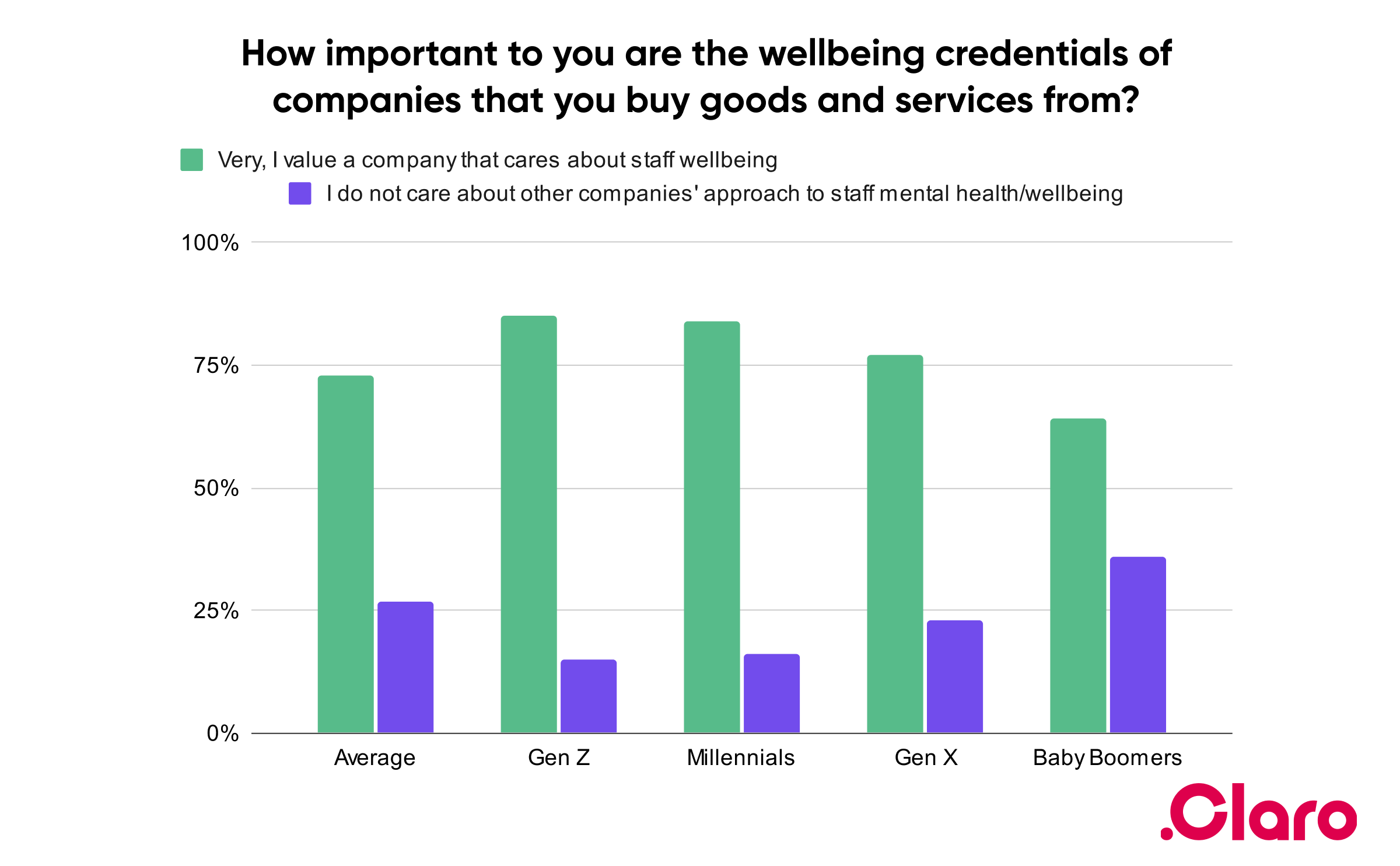6 min read
Should employers acknowledge Blue Monday?
Blue Monday (15 January) has a mixed reputation. But there’s still value in using the day to raise awareness of mental health and wellbeing...

After analysing the results from our May 2023 wellbeing washing survey of 1,000 UK workers, five statistics stood out.
Wellbeing washing – when an organisation publicly displays support for mental health initiatives but lacks adequate mental wellbeing support – has become an increasingly important topic for HR leaders in recent months.
So, Claro Wellbeing conducted some new research into how the phenomenon affects employees.
After analysing our results from 1,000 UK workers, five statistics stood out.
On average, 38% of employees think their company is guilty of wellbeing washing. But some age groups believe so more than others.

54% of Gen Zs and 52% of Millennials said they believed their company was guilty of wellbeing washing. While 42% of Gen X and 29% of Baby Boomers believed the same about their employer. Indeed, the younger you are, the more likely you believe your employer is wellbeing washing.
This is a complex trend with many possible explanations. But one correlation spotted in our data is that younger generations also tend to value organisations that care about wellbeing more so than older generations do. Perhaps, to some extent, younger generations are more aware of the trend.
For HR and wellbeing leaders, it’s crucial to understand how wellbeing policies, initiatives and activities might be received across an organisation, and to try to understand the expectations that employees of different demographics might have.
Some 23% of employees said their companies had been criticised for their mental wellbeing conduct in the past.
The most common forms of criticism were word of mouth from fellow employees, those outside the organisation and online forums like Glassdoor.
.png?width=2400&height=1484&name=Frame%209641%20(1).png)
Some 1 in 9 (12%) survey respondents even said their business has been ‘called out’ multiple times.
A damaged reputation can be difficult to quantify and challenging to repair. In an organisation, trust builds slowly but can be shattered quickly. Our report reveals data on how long it takes firms to recover from a wellbeing washing crisis.
Of those we surveyed, only 36% of employees said their organisations have mental health support that they deemed ‘good’ or ‘outstanding’.
This figure is low when you consider that as many as 71% of workplaces celebrate mental health awareness days or weeks. And it signals a clear misalignment in the readiness of employers and employees to share the successes of their employee wellbeing programmes.
As many as 34% of UK employees are putting in more than their contracted hours each week and not being paid for it – risking burnout and eroding workplace culture. 22% employees say this amounts to one to five hours of unpaid overtime a week.
Research shows burnout can lead to serious physical and mental health risks for employees. When evaluating an employee wellbeing programme, it is important to consider the contractual mechanics of the employee-employer relationship.
Before adding initiatives, awareness weeks or other activities, get the fundamentals right: ensure that key components of the employment contract, like overtime rates, are understood and respected by employer and employee alike.
73% of those we surveyed said that a business’s approach to staff wellbeing matters when buying goods and services from them – so clearly wellbeing matters to customers, not just employees.
Given the reputational risks of wellbeing washing, detailed further in our report, it’s critical to consider its potential impact on your organisation’s bottom line and overall value.

To sum up:

6 min read
Blue Monday (15 January) has a mixed reputation. But there’s still value in using the day to raise awareness of mental health and wellbeing...

4 min read
Ever wished you had a money-whiz friend you could ask anything, as often as you like?

7 min read
Millions are being impacted by financial stress. Yet, until now, workers in frontline occupations have not been able to benefit from educational...